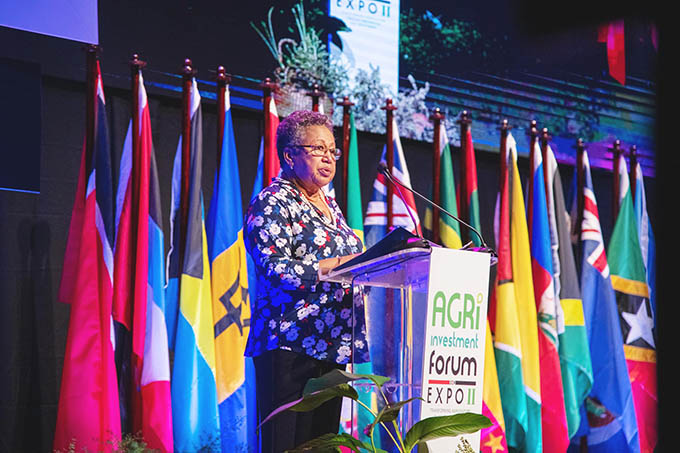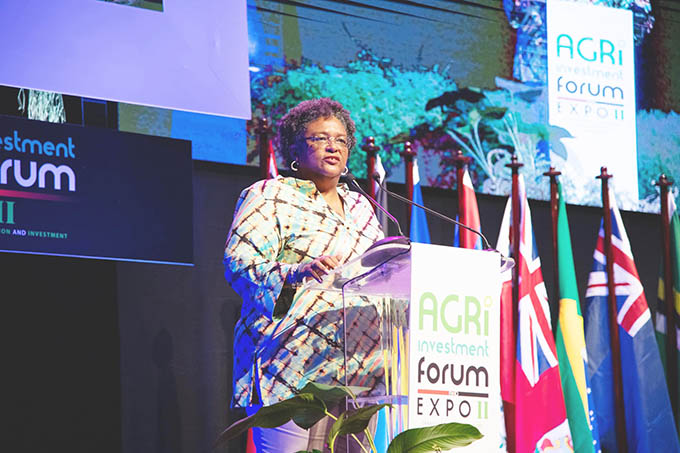Prime Minister of Barbados Mia Mottley on Friday urged CARICOM to act with urgency to bring the region to a state where it can sustainably feed itself, while noting that within the current climate “food and water are the new oil”.
Mottley made the statement while addressing the opening of the second instalment of the Agri-Investment Forum currently ongoing in Trinidad.
Mottley said that the world is faced with the confluence of three crises—notably the war on climate change, the COVID pandemic and steeply rising inflation owing to the war in Ukraine. Those factors, she noted, are pivotal to the access and affordability of food, which means that CARICOM should be acting with much greater urgency towards achieving food sustainability.

Guyana’s President Irfaan Ali is leading the charge to reduce CARICOM’s food import bill by 25% by 2025. The ongoing forum is a result of that drive and aims to attract investors in agriculture to improve production and reduce importation.
Mottley told the gathering at Trinidad’s National Academy for the Performing Arts that these have sent a clear message to leaders that the impact on food supply will continue well into 2023. She noted that the plan cannot just be medium-term way of addressing production in certain sections rather it should be holistic and long-term.
“It is against that backdrop that in Guyana [in May] I spoke about the six-week crops and the 12-week crops and I speak today also about the six weeks livestock. None of us can avoid the reality that our people must eat and the reality is that there are things that we can do and that we have done in our past to ensure survival and we are there again. Whether it is rabbits or chickens, whether it is fishing, whether it is new forays as we are doing in Barbados into aquaculture, we have the responsibility for urgent action today.
“Since Guyana, we were asked also to put together a framework for financing. Barbados has worked assi-duously with the financiers as well as with the regional and international organizations…,” she said.
She also noted that the region will need all the training and development it can get since many people have lost their knowledge of farming, before adding that the support of extension services and Ministries of Agriculture will become critical in the achievement of 25 by 2025.
“But it is not only the small scale production that is going to help us solve the problem. That will help ease hunger. But it will not reach the goal of 25 by 2025 and quite frankly, with the confluence of the three global events as I indicated in Guyana, I don’t know that 25 by 2025 is any more appropriate. In September 2018 when we set this target at the Regional Ministers of Agriculture Meeting in Barbados, it was not a world that was being driven by a pandemic nor by inflation. We knew of the vagaries of climate but it was not yet what we are,” the Prime Minister related.
She then said 25 by 2025 can only be achieved by shifting the goal posts – something the Caribbean have adapted well to. Mottley told the gathering that while financing is critical towards achieving food security, reliable and affordable transportation is also a major part that needs to be addressed.
Mottley explained that the region has to confront the difficult issues with respect to maritime and air transport. She said that the heads are working on addressing the challenges but have not reached a point where they can deal with the challenges in a holistic manner.
…eating what we produce
Mottley called on Caribbean people to change their expectations and start consuming what the region produces not only for sustainability but also for their health.
“We have to start eating what we grow and growing what we eat and we have to do it not only because of the economic requirements but because of the health requirements. The reality is that every major health site will tell you about the appropriate use of low glycemic foods. Most of that we grow here,” she informed.
She added that for the first time, the Caribbean has the opportunity of production matching what it needs but explained that the missing factor is whether it will be accepted by the people who are integral to the programme’s success. Mottley said that the regional heads understand that they need to make food more accessible and affordable but pointed out that the onus is on every citizen to ensure that they choose to eat what is regionally produced.
“We are facing a pivotal moment in Caribbean civilization and it is up to us not just as leaders, but as Caribbean people to embrace this opportunity…we have planned, we have secured and we’ve understood the battle both at the level of the smallholder but also the level of large production entities to transform ultimately, the production and agro-processing of food in this region. Food and water are the new oil,” Mottley said.
Confronting the challenges
Meanwhile, CARICOM Secretary-General Dr Carla Barnett said that as part of a high-level response, CARICOM through President Ali and the Special Ministerial Taskforce on Food Production and Food Security (MTF), has placed agriculture at the forefront of production-related policies, programmes and projects for the region. The MTF is seeking to actively ensure a strong focus on innovation and technology transfer as CARICOM seeks to increase production of the specially targeted commodities so as to achieve the target of 25% reduction in its food import bill by 2025.
She noted that the focus encompasses water management, market information, application of technological solutions, climate resilient planting materials, sustainable land and soil management, as well as the preservation of the Region’s biodiversity.
“Declining rainfall and saltwater intrusion as a result of sea level rise compromise the Region’s water resources, requiring significant investments to ensure a safe water supply in the Region. This, together with higher temperatures, pests, reductions in the agricultural labour force and more extreme events are reducing yields in the Caribbean and causing more crop losses.
“The results of the April 2022 CARICOM/World Food Programme livelihoods survey were quite discouraging. It concluded that the incidence of food insecurity is rising and is having a devastating effect on the people of the Region.
“The key messages, as daunting as they are, include – food insecurity has further increased; food prices are increasing, and people are adopting negative coping strategies to make ends meet,” the Secretary-General informed.
To address the challenges, Dr Barnett informed that CARICOM has approved the Trade Policy for Animals and Animal Products, which will create a harmonized procedure for all Member States within the Region; the Regional Agricultural Health and Food Safety Policy; the Alternate Sanitary and Phytosanitary (SPS) Dispute Resolution Mechanism; and 19 Special Guidelines for the Trade in Animal and Plant Commodities. Additionally, CARICOM has strengthened partnerships with stakeholders and moved closer to the free movement of agricultural workers within the bloc.
“Achieving food and nutrition security and, in particular, achieving the early target of reducing food imports 25% by 2025, require us to be all on board and all hands on deck. The challenging global economic conditions have given us the clearest indication that in order to survive as a region, we must pull together in the spirit of the shared vision that created the Revised Treaty of Chaguaramas (RTC).
“Member States have demonstrated the resolve to remove all of the impediments which have for far too long retarded the growth of the regional agricultural sector and that process, as indicated earlier, has taken already taken off. There is a role for all to play. This is our region,” Dr Barnett said.
She also noted that embracing technology and innovation will be critical to overcoming the challenges the region faces.










